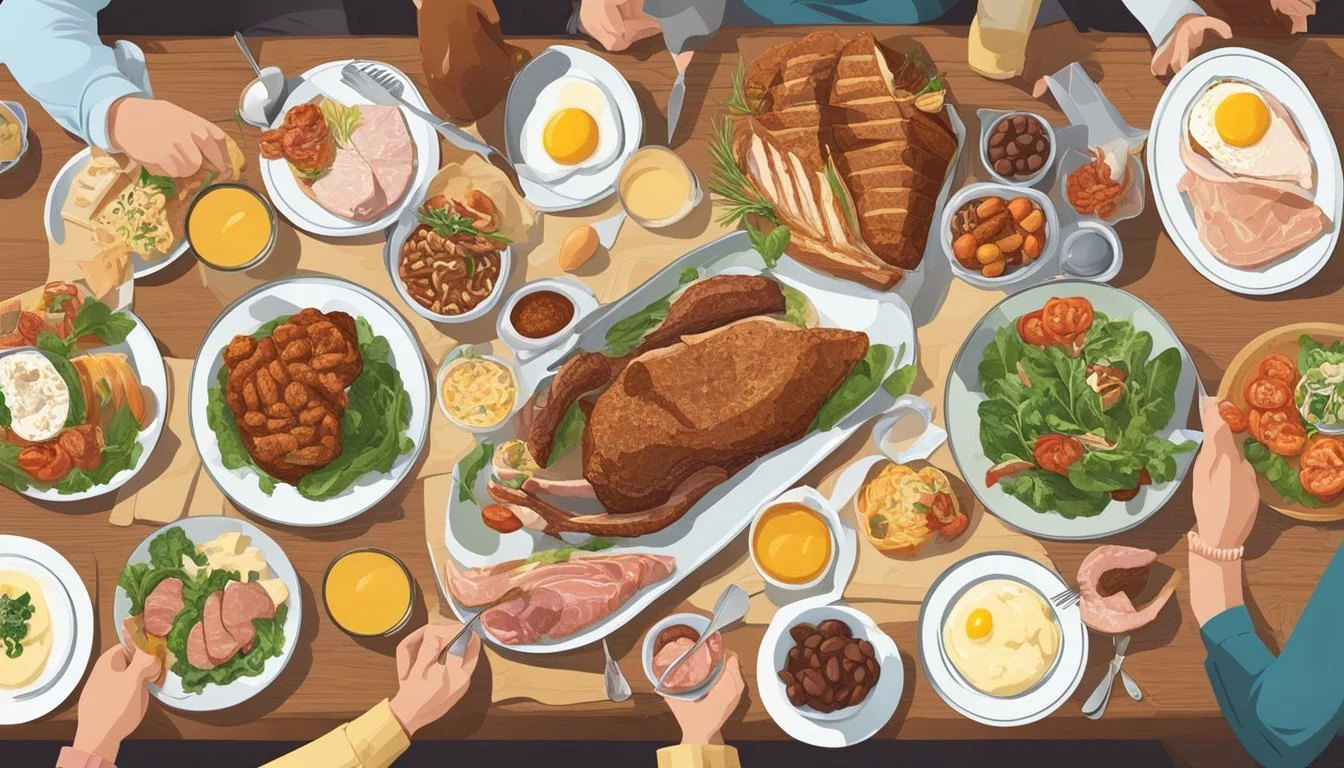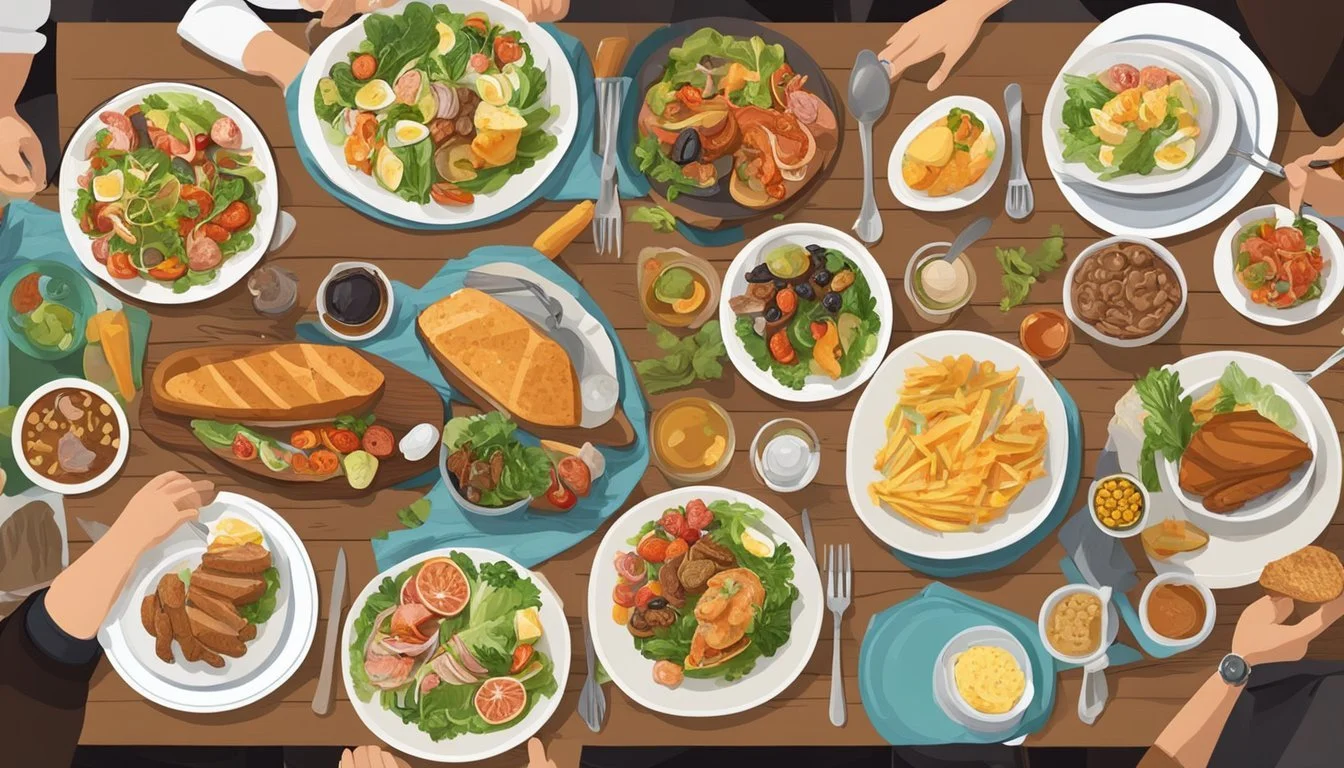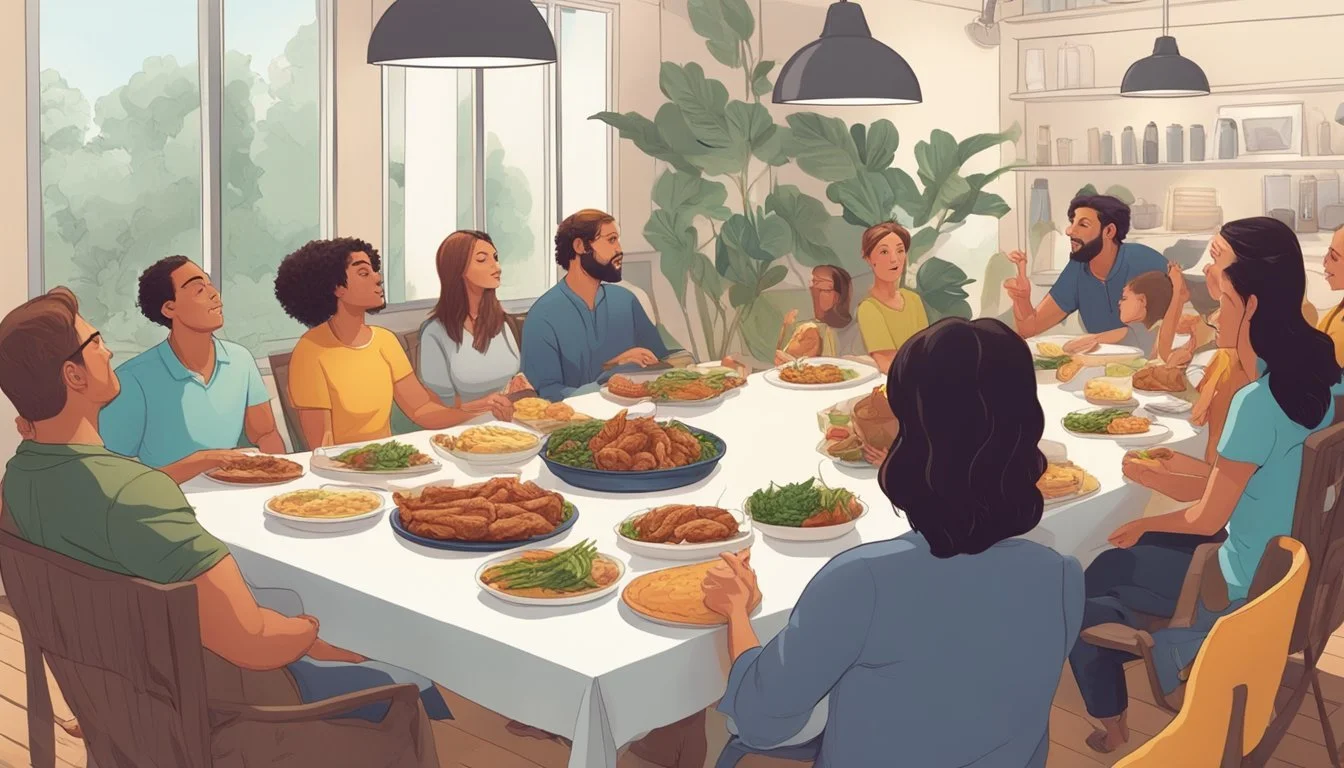How to Handle Social Situations on a Carnivore Diet
Navigating Dietary Choices Confidently
Adopting a carnivore diet often brings a significant shift in eating habits, which can present unique challenges in social settings. The diet, emphasizing the consumption of animal products exclusively, often diverges from mainstream dietary patterns that include a wide range of plant-based foods. When a person on a carnivore diet attends social gatherings, such as family dinners, company events, or dining out with friends, they must navigate a food landscape that is typically not tailored to their eating regimen.
The key to handling social situations while maintaining a carnivore diet lies in effective communication and planning. Individuals may find it beneficial to inform hosts of their dietary preferences in advance, thereby giving them the opportunity to prepare suitable options or allowing the guest to bring their own carnivore-friendly dishes. It is also helpful to familiarize oneself with the menus of restaurants beforehand to identify which meals align with the carnivore diet, ensuring a stress-free dining experience.
Moreover, those on a carnivore diet might encounter curiosity or skepticism from peers regarding their food choices. Clearly articulating the personal health benefits and the nutritional reasoning behind the diet can foster understanding and even dispel common misconceptions. By approaching social situations with confidence and preparation, individuals following a carnivore diet can navigate social settings without compromising their dietary principles.
Understanding the Carnivore Diet
The Carnivore Diet is predicated on the consumption of primarily animal products, eschewing all plant-based foods. This section elucidates its core principles, nutritional aspects, health benefits, and tackles some common misconceptions.
Core Principles of Carnivory
The Carnivore Diet is grounded in the consumption of meat, fish, eggs, and dairy products, focusing on high intake of proteins and animal fats. It eliminates the inclusion of plant-based foods such as fruits, vegetables, grains, and legumes. The Carnivore Diet's foundation is built upon the belief that human physiology is best supported by these nutrient-dense animal foods.
Health Benefits and Nutrition
Those who adhere to the Carnivore Diet often report experiences of weight loss, increased energy levels, mental clarity, and reduced inflammation. The diet provides a substantial amount of essential nutrients including vitamins such as B12 and D, and minerals like zinc and iron, which are crucial for maintaining good health:
Vitamins: B12 and D are plentiful in animal products, supporting bone health and the nervous system.
Minerals: Zinc and iron found in meat contribute to immune function and hemoglobin formation.
Protein: A vital macronutrient for muscle repair and growth, is abundant in all forms of animal products included in the Carnivore Diet.
Common Misconceptions
There are several misconceptions about the Carnivore Diet, one being that it's nutritionally deficient. However, the diet can provide necessary nutrients through a carefully selected range of animal products. Another misunderstanding is that the diet is overly restrictive or unsustainable; it's important to note that many have successfully followed this way of eating, reporting sustained health benefits. It's also commonly thought that a plant-free diet leads to increased health risks, but current proponents argue that eliminating plant-based foods reduces exposure to antinutrients and inflammation triggers.
Preparing for Social Events
When venturing into social situations on a carnivore diet, careful planning and strategy are paramount. One must navigate dietary restrictions with finesse to maintain both their social life and health goals.
Planning Ahead
Communication is Essential: To ensure a smooth experience at an event, one should inform the host of their dietary preferences. By doing so, the host can potentially make arrangements to accommodate the carnivore diet. Additionally, planning one's meals in advance is crucial. They might want to consider options that are compatible with their dietary restrictions, such as preparing and bringing their own carnivore-approved dishes to the event.
Implementing a Meal Strategy: Party-goers may choose to eat beforehand to mitigate hunger and avoid the temptation of non-compliant food items. One can also carry snacks such as jerky or hard-boiled eggs for convenience.
Researching Carnivore-Friendly Venues
Identifying Appropriate Restaurants: Individuals should research restaurants in advance to find carnivore-friendly venues. They can look at online menus or call ahead to confirm options that suit their needs.
Creating a Venue List:
Example 1
Carnivore Options Available: Yes - list items
Contact Information: 123-456-7890
Example 2
Carnivore Options Available: Limited - specify items
Contact Information: 098-765-4321
Keeping a list like this on hand can simplify the decision-making process when dining out with friends or attending events held at restaurants.
Meal Modification Strategies
Understanding Menu Items: A person should familiarize themselves with the menu to understand how they can adapt available dishes to their diet. They might need to request modifications such as removing buns from burgers or choosing dishes that primarily feature meat.
Negotiating with the Kitchen: Politely asking the kitchen to accommodate the carnivore diet with simple changes (e.g., grilling instead of frying) can often result in a satisfying meal. Explaining one's dietary needs clearly and respectfully can make the modification process smoother for both the customer and the kitchen staff.
Navigating Social Gatherings
Entering a social gathering can present challenges for those on a carnivore diet. This section provides strategies to handle questions and judgments, contribute suitable dietary options, and offer education on this dietary choice.
Dealing with Questions and Judgment
When attending family gatherings or social events, individuals on a carnivore diet often face curiosity or skepticism. It's important to respond to questions about their dietary choices with short, factual answers. For instance, they can say, "I've chosen this diet for health reasons and it works well for me." They should remain polite, avoiding confrontational or defensive reactions to any judgment they might encounter.
Contributing to Gatherings with Carnivore Options
One practical approach is to bring your own meat or carnivore snacks to share. This ensures that there are suitable options available, and it can even spark interest among other guests. They might bring dishes like:
Deviled eggs
Meat and cheese platters
Educating Friends and Family on Dietary Choices
When there is interest, the individual can educate friends and family about the carnivore diet by sharing personal experiences and the benefits they've noticed. This should be done in a respectful and non-confrontational manner, offering information only when others express genuine interest. They can prepare by having straightforward facts about the diet's potential benefits — such as weight loss and mental clarity — ready to share.
Building a Support System
Embarking on a carnivore diet can be a transformative journey that requires support along the way. It's important for individuals to find others who understand their dietary choices and who can offer guidance and encouragement. Building a strong support system can significantly enhance one's commitment and enjoyment of the carnivore diet lifestyle.
Finding Like-Minded Individuals
Seeking support from like-minded individuals is a key strategy for those on a carnivore diet. Local meat-based diet groups and fitness networks can provide face-to-face interaction and help with resources or advice. People often find it beneficial to connect with others who share similar dietary goals and experiences, as this can lead to long-term friendships and a sense of community.
Join local nutrition groups: Look for groups through health food stores or community centers.
Attend workshops and meetups: Keep an eye out for local events dedicated to the carnivore diet or animal-based nutrition.
Leveraging Online Communities
Online communities are vital for those who may not have access to local support networks. There are numerous forums, social media groups, and online platforms where individuals can seek support and share their carnivore diet experiences.
Participate in online forums: Websites like Reddit and carnivore diet-specific forums are excellent for advice and support.
Follow social media groups: Platforms like Facebook and Instagram host groups and pages where members post recipes, tips, and motivational stories.
Educating Others and Sharing Resources
Being on a carnivore diet often presents the opportunity to educate others about its potential health benefits. Sharing scientific articles, recipes, and personal success stories can help dispel misconceptions and provide valuable resources to both newcomers and skeptics alike.
Provide accurate information: Share well-researched articles and studies to help educate friends, family, and peers.
Distribute meal plans and recipes: Offer guidance on how to approach the diet by providing practical, easy-to-follow meal plans.
Dining Out On a Carnivore Diet
When eating out on a carnivore diet, diners face unique challenges, such as finding suitable options and ensuring the quality of the meat. These strategies can help adhere to dietary preferences while enjoying a meal at a restaurant.
Choosing the Right Restaurants
Identifying restaurants that cater to a carnivore diet is crucial. Steakhouses and seafood restaurants typically offer the widest variety of pure meat options, making them a preferred choice. Diners should prioritize establishments known for serving top-quality cuts of meat, as these are likely to provide the high-quality, carnivore-friendly fare they require.
Navigating Menus and Ordering
Once at the restaurant, focus on the menu sections that list unadorned meats, such as steaks or grilled seafood. It is important to inquire about any potential hidden ingredients, such as marinades or sauces that may contain sugars or carbohydrates. Clarify to the server that the meal should contain only the chosen cuts of meat, and politely request any necessary modifications to suit the carnivore diet.
Bringing Your Own Carnivore-Friendly Options
In situations where menu options are limited, those on a carnivore diet might consider bringing their own carnivore-friendly snacks. Small items like jerky or hard-boiled eggs can be discreet and can help tide one over if the meal at the restaurant is not entirely suitable. Always check with the restaurant first to ensure that this is acceptable, as policies about outside food can vary.
Dealing with Dietary Restrictions and Social Pressure
Individuals following a carnivore diet often face unique challenges in social settings. This section focuses on maintaining a balance between social life and dietary goals, effectively communicating these goals, and managing peer pressure.
Balancing Social Life and Dietary Goals
Adhering to a carnivore diet requires one to consume primarily animal products, which can make social dining complex. It is important for an individual to plan ahead when attending social events. They can offer to bring dishes that fit their diet or suggest restaurants that cater to their eating style. Maintaining this diet requires a compromise between socializing and strict dietary adherence, and finding this balance is crucial for long-term success.
Communicating Your Dietary Restrictions
Clear and respectful communication about one's dietary restrictions is essential. An individual should inform hosts of their dietary needs beforehand to avoid surprises. This can be done by explaining the nature of their diet in a concise manner, emphasizing health reasons if necessary, and showing appreciation for the host's understanding. Providing specific examples of acceptable foods can help hosts accommodate their needs.
Resisting Peer Pressure and Cravings
Peer pressure and cravings can present significant obstacles. When faced with social pressure, an individual should assert their dietary choices calmly and with confidence. It's beneficial to have a support system of friends or family who understand and respect their dietary choices. Additionally, one can seek out alternative options at social gatherings, such as focusing on meats and cheeses, to satisfy cravings while staying true to their carnivore dietary restrictions.
Maintaining the Diet Long-Term
Long-term adherence to a carnivore diet requires strategic planning to handle nutrient deficiencies, implement sustainable practices, and consult with healthcare professionals to maintain health benefits and manage challenges.
Handling Nutrient Deficiencies
A carnivore diet primarily consists of animal products, and while it is rich in certain nutrients, it may lack others typically found in plant-based foods. Adherents should monitor for signs of nutrient deficiencies, such as fatigue or poor immune function, and consider strategic inclusion of:
Organ meats: These can provide essential vitamins and minerals such as vitamin B12, iron, and zinc.
Seafood: Including fatty fish like salmon for omega-3 fatty acids supports heart and brain health.
Supplementation: In some cases, supplements may be necessary to address specific nutrient gaps.
Ensuring a variety of animal-based foods can help mitigate potential deficiencies.
Implementing Sustainable Practices
Staying on a carnivore diet for the long term involves more than just personal health; it includes understanding the broader impact of one's dietary choices. To make the diet more sustainable, one might:
Source responsibly: Opt for grass-fed, pasture-raised meat from local farmers to support animal welfare and reduce environmental impact.
Reduce waste: Utilize as much of the animal as possible, including bones for broth and organ meats, to minimize waste.
Balance intake: Understand portion sizes to ensure one is not consuming an excess of calories, which can strain both health and resources.
These practices foster a more Earth-conscious approach and can maintain positive social relationships surrounding food choices.
Consulting with a Healthcare Professional
Each individual has unique health requirements, and a healthcare professional can provide personalized information and advice. They can monitor health markers, treat any arising health conditions, and adapt the diet for the patient's needs to include:
Necessary adjustments for pre-existing conditions
Advice on maintaining flexibility within the diet without compromising on its core principles
Guidance on how to balance the diet with social and relationship dynamics
It’s important to regularly revisit one's health plan with a professional to ensure it aligns with current health status and goals.
Conclusion
Adhering to a carnivore diet in social settings requires forethought and confidence. Individuals may experience health improvements and find the diet’s simplicity in choosing foods liberating. However, one's commitment can be tested during social interactions. Practical tips such as planning ahead, communicating dietary preferences, and seeking out high-quality animal-based foods are crucial.
One should:
Plan meals in advance, ensuring a variety of animal products are included to meet nutritional needs.
Communicate clearly with hosts about dietary restrictions to avoid any discomfort.
Join support groups for social and emotional backing.
To stay consistent with the carnivore diet, individuals can:
Choose restaurants with suitable options.
Offer to bring a dish to social gatherings.
Focus on the social aspect of gatherings, rather than food alone.
In summary, successfully navigating social situations while maintaining a carnivore diet centers on preparation, open communication, and leveraging community support. These strategies help ensure a person stays true to their dietary choices without sacrificing social engagements.





